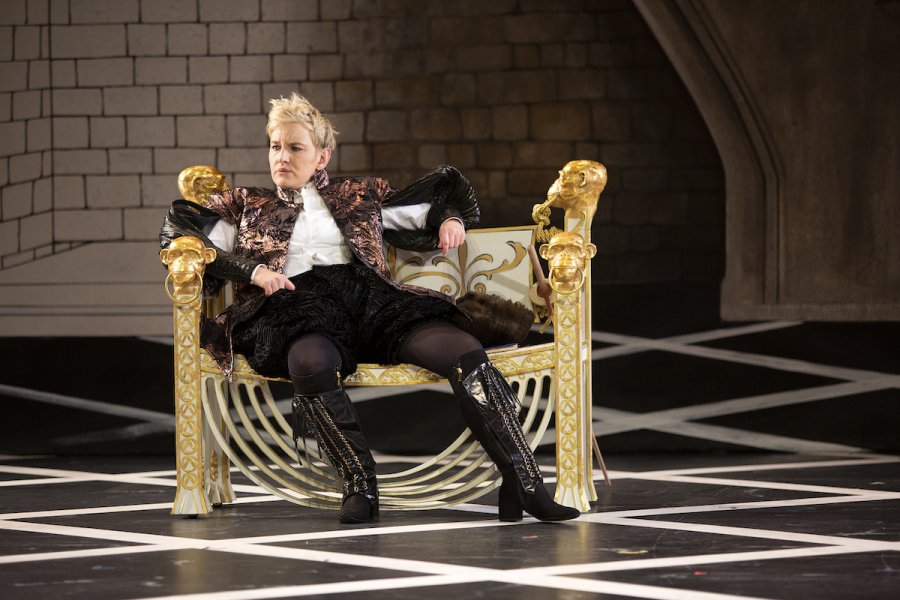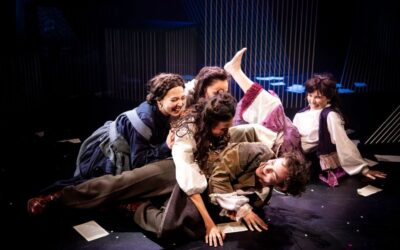By: Adam Rafferty
Arguably the progenitor of modern celebrity, Sarah Bernhardt was the most famous actress and theatre manager of the late 1800s and early 1900s, also known as the Belle Époque. Long before the superstars of Hollywood’s golden era, Bernhardt toured the world to tremendous acclaim, playing all the great female roles, including Cleopatra, Phèdre, Lady Macbeth, Joan of Arc and most famously, Marguerite Gautier in La Dame aux Camélias where her death scene became legendary.
As the focus of a stage play, the French actress lived a life full of fascinating record, so American playwright Theresa Rebeck (Seminar, Spike Heels and NBC’s Smash) has chosen a moment in time where her subject’s acting process and discovery were as much under pressure as her private life. For although Bernhardt was enormously hardworking and capable of raking in the earnings, her tastes for the finer (and perhaps more gauche) things in life, combined with her ambitions, meant that by 1899, her bank balance needed success as much as her artistic ego craved it.
Audiences still loved her, but aged in her mid-fifties, she couldn’t continue to die on stage as the Lady of the Camellias, a role she’d first played nineteen years prior. What better way to create ‘buzz’ and fill her newly acquired theatre, than to audaciously cast herself in none other than one of the greatest male roles ever written: Hamlet. And what better actress of the Australian stage to play Sarah Bernhardt than Kate Mulvany?
Having performed both Lady Macbeth and Richard III in her own stellar theatre career, Mulvany is perfectly attuned to capture Bernhardt’s passion and restlessness and she does so with awesome virtuosity. While Bernhardt had difficulty coming to grips with Shakespeare’s iamb, Mulvany clearly has no such problem, stunning as Hamlet, and then engrossing the audience with a charmingly light touch as she cheekily argues with her retinue after rehearsals in her garishly decorated salon.
In fact, set and costume designs by Marg Horwell are not only a feast for the eyes, but feature wonderfully abstracted and exaggerated styles of the era. Cloth backdrops are painted in glorious watercolour with stunning perspective, set dressings are outrageously patterned and oversized, costumes have period accuracy in shape but use contemporary fabrics, colours and patterns. Horwell’s work here should make her an early contender for this year’s artistic awards.
Director (and new Artistic Director for the MTC) Anne-Louise Sarks has put together a well-structured production that shows great love for the actor’s process that Rebeck has captured so amusingly, even though at times, the scenes of ‘performance’ drag down the pace of the show. We’re not really here to see Hamlet or Cyrano performed, so we don’t really need to luxuriate in those works. Where Sarks is most successful is in highlighting Bernhardt’s powerful skill of enchanting men and flattering their egos, so as to achieve her own goals, and win arguments too.

The only man in her life those skills of enchantment didn’t work on so well was her son Maurice (William McKenna) who arrives in the second act, trying to curtail her spending for his own financial interests. Having stunned MTC audiences with his brilliant performance in last year’s Admissions, McKenna continues to impress with his ability to sweep fresh air into a production as soon as he sets foot on stage.
Constant Coquelin (Marco Chiappi), Bernhardt’s regular leading man, has oodles of Hamlet experience to draw on, and Chiappi uses that to skilfully bring comic relief to the Shakespearean ‘rehearsal’ scenes, while John Leary is delightfully pompous as critic Louis who scoffs at Bernhardt’s plans to play the Prince of Denmark. Czech artist Alphonse Mucha (Tim Walter) painted many of the gorgeous Art Nouveau style posters used to advertise Bernhardt’s plays and Walter beautifully captures the enthrallment in which she held him, no doubt due to the fame his work for her quite suddenly brought him.
While much of Rebeck’s plot is based in historical accuracy, she imagines the idea of playwright Edmond Rostand (Charles Wu), most famous for Cyrano de Bergerac, having an affair with Bernhardt as she has him rewrite Shakespeare’s poetry to create a prose adaptation of Hamlet. While in truth, two other writers took on this task, the concept does allow for a much more fascinating narrative that intertwines Bernhardt with Rostand’s wife Rosamond (Izabella Yena), famous for a poetic couplet she wrote for her love of Rostand in 1889. Yena is somewhat out of her depth opposite Mulvany however, unable to match her vocal strength and dialect, and deflating what is otherwise a wickedly well-crafted scene.
While Bernhardt/Hamlet isn’t a show for those with a passing interest, the quality of the central performance and the gorgeous visual design make this a highly entertaining production for lovers of historical fiction and the art of performance.
Images: Pia Johnson





